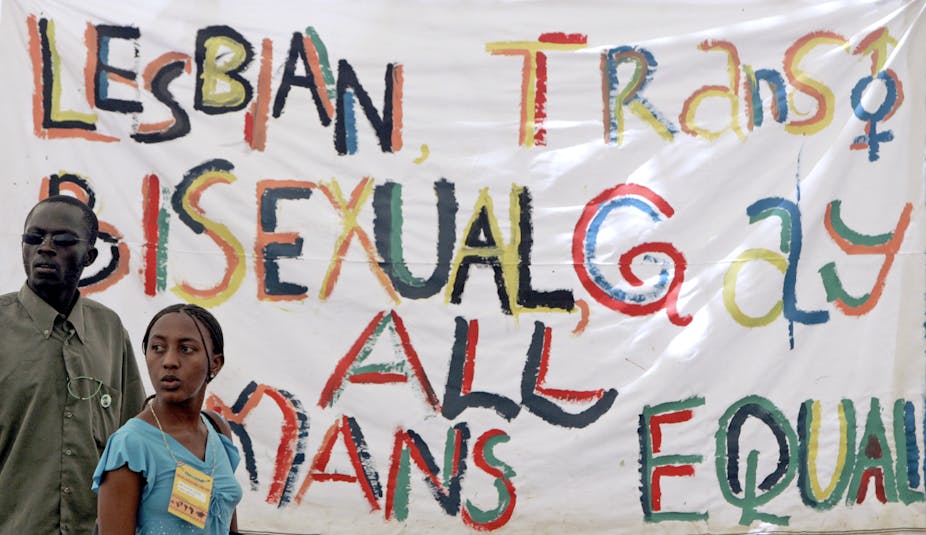The African Union’s longest serving human rights body, the African Commission on Human and Peoples’ Rights, is celebrating 30 years since its inauguration. Regrettably, celebrations have been stifled by an unresolved challenge to its autonomy. What’s at stake is the commission’s ability to do its job of making sure that AU member states comply with its main human rights treaty, the African Charter on Human and Peoples’ Rights (African Charter).
The crisis has its origins in April 2015 when the commission granted observer status to the South African based NGO Coalition of African Lesbians. Being given observer status gives an NGO the right to participate in the commission’s sessions. It’s usually a rather routine affair – more than 500 NGOS have been given the status.
The Coalition of African Lesbians case was out of the ordinary because it was the first time an openly lesbian, gay, bisexual or transgender organisation had been granted observer status.
Every six months, the African Commission submits a report of its activities to the AU’s executive council, a political body consisting of the ministers of foreign affairs of member states. The report is tabled for the executive council’s “consideration”. The current situation arose when the council took the unprecedented step of telling the commission to reverse one of its findings in the activity report related to human rights.
When the executive council “considered” the commission’s report it directed it to withdraw Coalition of African Lesbian’s observer status. The executive council argued that granting observer status to the coalition was not “in line with … fundamental African values, identity and good traditions.
The conclusion is inescapable – a political body of the AU is second guessing a legal body in its interpretation of a legal text, the African Charter, on the basis of prejudice against lesbian, gay, bisexual or transgender people.
The council’s decision was not only unprecedented, it is also deeply troubling given the commission’s role as the watchdog of human rights on the continent. Its mandate is to interpret the African Charter without fear or favour. If politicians are allowed to dictate how it does its job, the commission will no longer be autonomous and independent. And its role of supervising states will be eroded badly.
The commission has a great deal to be proud of. Over the past three decades it has advanced the rights of individuals and groups in AU member states when their rights were at risk, and provided remedies to many of them. It also held states accountable for human rights violations. And it contributed to building a culture of human rights among governments and civil society, providing a forum where they could discuss human rights.
Court’s failure to defuse the crisis
To make matters worse, the African Court on Human and Peoples’ Rights recently missed an opportunity to defuse this looming crisis. One of the court’s functions is to give advice about the interpretation of AU legal texts. Making use of this opportunity, the Coalition of African Lesbians and another NGO, the Centre for Human Rights at University of Pretoria, approached the court in an attempt to defuse the situation. They asked it to answer the question whether the executive council may, as part of its competence to "consider” the commission’s report, overrule the commission’s decisions resolved.
We submitted the request in line with the court’s protocol which allows “African organisations recognised by the AU” to submit request for advisory opinions.
Unfortunately, the court adopted a very narrow approach in its finding. It held that the two NGOs were not “recognised by the AU”, and therefore not entitled to make a request to get the dispute resolved. This is despite the argument that they are recognised because they both enjoy observer status with the African Commission.
In effect, the court decided that only NGOs that have entered into a formal memorandum of understanding with the AU Secretariat (AU Commission) are entitled to approach the court with advisory requests.
What next?
Ideally, the court needs to resolve what is essentially an intra-AU constitutional dispute. But the court does not act at its own initiative.
There are two realistic possibilities to get the court to issue an advisory opinion. The Commission itself, and any other AU body such as the African Committee of Experts on the Rights of Welfare of the Child, could approach the court with a request for an advisory opinion. Or an NGO that’s got a memorandum of understanding with the AU Secretariat could submit such a request. But to get there will require these bodies – or a qualifying NGO – to take action on an issue that some of their members may see as politically too controversial and risky.
If the court’s advisory role is not brought into play, the executive council and the African commission will remain on a collision course that may seriously jeopardise the protection of human rights within the AU. If the matter is left unresolved, one of two things will happen: either the commission will have to give in and withdraw observer status for the Coalition of African Lesbians, seriously undermining its authority and legitimacy. Or it will have to defy the executive council. The consequence of this could be that it sees support – financial and other – cut. Such cuts are likely to diminish its role of protecting the rights of people living on the continent.
It is in the best interest of everyone in AU member states that this matter be resolved in a way that defuses the potential for conflict between the two bodies.

